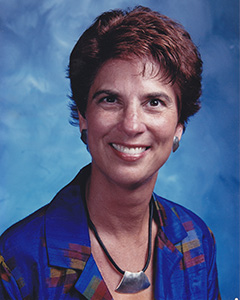
Barbara Swovelin
“Give me six hours to chop down a tree and I will spend the first four sharpening the axe,” said Abraham Lincoln, clearly a proponent of preparation. To apply his strategy to academic testing, a test preparation course is the best tool for sharpening.
For over 20 years, students have been maximizing their test-taking potential by taking the test prep courses offered at SDSU Global Campus. They learn important strategies, expectations, and content specifics about the CBEST, GMAT, GRE, and LSAT exams. The classes are held in partnership with BTPS Testing, distinguished by its outstanding educators. One such educator is Barb Swovelin.
How did you became a test preparation instructor at SDSU Global Campus?
I was an English teacher for 34 years; a College Board Consultant with both national and international experience; an ETS essay reader; a test preparation instructor since 1984; and I have a master’s degree in British Literature. I began teaching for Bobrow Test Preparation Services after being introduced through a fellow English teacher.
Which test prep courses do you teach?
I regularly teach courses for the GMAT, the GRE, and the LSAT. Occasionally I teach SAT and CBEST courses.
How many days does a typical course meet and how many hours per session?
Each course is conducted over four Saturday classes, and each class meets from 9 a.m. to 3 p.m.
Does the course require homework outside the classroom?
There is no assigned homework, per se, but on non-class days, we encourage students to practice their test-taking skills for about two hours daily. This additional practice helps to maximize the value of the course for each student.
Can you summarize a test-proven strategy that you use in your instruction?
To prepare for the Reading Comprehension section, for example, I provide strategies that allow for effective reading of the prompt passage, along with specific techniques to master the most common question types, as well as tools that are used to quickly eliminate wrong answers.
What’s the general outlook of students who complete the course? Do they feel confident and ready to tackle the test?
YES! My students gain confidence by knowing what to expect on the exam, by knowing how to approach the different sections, and by getting practice on the various question types, both in-class and at home.
Do students take advantage of the course’s great feature of a free repeat if needed?
Absolutely. We have repeat students in virtually every class. The students return for a variety of reasons. Some never got around to taking the exam and now they want a refresher; some took their first try at the exam but did not achieve the score they wanted, so now they want to improve their skills even more. Some students plan from the beginning to take the class more than once to maximize their skills before tackling the actual exam.
As the author of Cliffs AP English Language and Composition and a writing expert, do you have a novel in the works or do any type of avocational writing?
Actually, no I do not. I’m more of a reader, myself. But I do work for the College Board training other teachers for AP teaching and have scored over 12,000 timed essays for ETS (Educational Testing Service).
What do you love most about your job?
It’s intellectually stimulating and very rewarding to watch students gain confidence and engage with the test strategies.
Who should take a test-prep course?
Anyone who wants help understanding how to intellectually approach the test, how to work through the questions and the reading passages. Anyone who wants to ensure that they can write a high-scoring timed essay, and/or how to understand the logical and critical reasoning sections. Many students take the course simply to learn specific test-taking strategies.
What’s the best advice you can give students about test preparation?
Give yourself plenty of time; you’ll find it takes longer than you think until you finally feel properly prepared. Learn about your own personal strengths and weaknesses by taking practice tests and identifying patterns. When reviewing your practice exams, don’t forget to analyze the wrong answers to better understand how they try to fool us. When taking the actual exam, concentrate on applying the strategies you learned in class and the tricks you learned in practice.
What would students be surprised to learn about you?
I’ve been happily married to another test-prep instructor since 1984 (it makes for some ‘interesting’ dinner conversations). We are both licensed pilots and we own our own little plane. In addition, we’re both accomplished skydivers; Jerry has over 7,000 jumps, I have over 2,000.